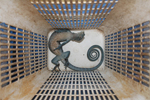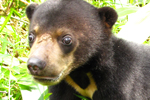In Indonesia, price for endangered orangutan is $200, leopard cat $25

Caged orangutan at Limbat’s ‘zoo’ in Kadang, Aceh on the island of Sumatra. Photo by Paul Hilton.
In a chilly rain on Sunday, in a town just a few kilometers beyond the edge of a protected Sumatran rainforest, a young orangutan sat perched on a piece of plywood and grabbed the metal wires of his tiny cage.
He has sat in that cage for six months and, like more than a dozen other species on display in this “zoo” in the town of Kandang in Aceh, he has a price tag.
This packed assembly is an acknowledged front for illegal trafficking in wildlife.
“It’s a zoo, but you can buy,” said the wife of the property’s owner. The critically endangered orangutan? $200. A leopard cat? $25-$50.
A steady rotation is evident. In March, a staff member of a Sumatran conservation organization working to fight the trade witnessed a critically endangered baby sun bear on the property. About a week later, two other bears sat caged, according to the same eyewitness. None are there now.
Primates appear to be frequently traded, or simply die from lack of care. Eight months ago, three other orangutans were caged here, witnesses said, along with a gibbon that has since died. One orangutan has disappeared, likely sold. When a flood hit on May 10, locals say one escaped and another drowned.
Trade in threatened species is illegal in Indonesia, but prosecutions are rare, conservation
organizations here say. As forests are increasingly cut down for plantations and mining concessions
in Aceh, trafficking in wildlife is growing. According to the the Sumatran Orangutan Quarantine Centre, of 143 orangutans confiscated in the province, not a single case has been prosecuted.
In a vegetable market high in nearby hills, a bird dealer approached by this reporter listed a
menu of protected species that poachers could procure with two-weeks’ notice. This included
protected hornbills, orangutans and golden gibbons, the last going for $100.

Sun bear illegally held as a pet at Limbat’s ‘zoo’ in Kandang, Aceh. Photo by Paul Hilton.
On this property in Kandang, endangered species have been openly caged for about three years. But its owner, Limbat, is a wealthy man widely seen by locals as untouchable.
On Sunday, some 15 other species taken from the surrounding rainforest were on display,
packed tightly in cages or tethered to trees. Near the orangutan, four pigtailed macaques sat in a
two-foot by six-foot cage just high enough for them to crouch but not stand. A ditch littered with
trash lay below it. Nearby, two other macaques were tethered to trees, a green cord wrapped around
one’s neck.
A baby macaque lurked nearby, hiding under a tarp. Above it, concealed under a coverlet,
was a tiny slow loris, listed as vulnerable in Sumatra. Ten feet away, two black binturong sniffed
this visitor’s hand, while a pangolin lay curled nearby in a tight ball. In yet another cage, a large
Sumatran tree squirrel paced franticly back and forth, its brown and white furry tail extended
behind it.

Pangolin held captive as a pet at Limbat’s ‘zoo’ in Kandang, Aceh. Photo by Paul Hilton.

Slow loris at Limbat’s ‘zoo’ in Kandang, Aceh. Photo by Paul Hilton.
During a flood in May, a large crocodile escaped into a small lake that abuts the property, but locals soon caught it and brought it back. It now lies static in a shallow concrete pool that is just wide enough for its body, but leaving it no space to move.
Among the animals not caged, but tethered tightly to a tree, was a sambar deer. The joint
above its left front hoof was broken when it was caught in a snare. It is now broken straight back –
and taped that way. After nibbling at a couple lettuce leaves, it crumpled down in the dirt, alongside
unlikely companions: a stork and a grey heron, their narrow legs also tied to saplings.
At one end of the property, under a tin roof rattling in the rain, Cokes and other refreshments
were available for visitors. But on this particular Sunday afternoon, none came.

Caged orangutan at Limbat’s ‘zoo’ in Kandang, Aceh on the island of Sumatra. Photo by Paul Hilton.
Editor’s note: this story originally misspelled Kandang as Kadang. We regret the error.
Related articles
Bizarre, little-known carnivore sold as illegal pet in Indonesian markets (photo)

(04/24/2013) Few people have ever heard of the Javan ferret-badger, but that hasn’t stopped this animal—little-known even to scientists—from being sold in open markets in Jakarta according to a new paper in Small Carnivore Conservation. The Javan ferret-badger (Melogale orientalis) is one of five species in the ferret-badger family, which are smaller than proper badgers with long bushy tails and elongated faces; all five species are found in Asia.
Indonesia remains epicenter for illegal wildlife trade in reptiles and amphibians

(10/24/2012) Demand for exotic pets is driving the illegal harvest and trade of herpetofauna (reptiles and amphibians) in Indonesian New Guinea, according to a recent study published in the journal Biodiversity and Conservation. Between September 2010 and April 2011, Daniel Natusch and Jessica Lyons of the University of New South Wales surveyed traders of amphibians and reptiles in the Indonesian provinces of Maluku, West Papua and Papua.
Slow lorises sold openly, illegally in Indonesia

(04/03/2012) Defying Indonesian law, slow lorises are being sold openly in Jakarta markets for the underground pet trade, according to wildlife trade monitoring group TRAFFIC. In the last two weeks, TRAFFIC has recorded fifty different individual slow lorises on sale in the Indonesian capital. “The openness of the slow loris trade highlights the fact that having one of the region’s best wildlife protection laws and promising to protect species is not enough—there must be stronger enforcement in Indonesia and the public should stop supporting the illegal wildlife trade,” says Chris R. Shepherd, Deputy Regional Director of TRAFFIC Southeast Asia, in a press release.
‘Where’s my mama?’: campaign targets cruel slow loris pet trade [warning: graphic photo]
(03/20/2012) A new campaign by The Body Shop West Malaysia and TRAFFIC Southeast Asia attempts to raise awareness of the illegal slow loris pet trade. YouTube videos of “cute” pet slow lorises have raised demand for these endangered primates, but as the campaign highlights the pet trade is fueling slow loris deaths in the wild and cruel treatment, such as pulling out their teeth, to make them more desirable pets.
Malaysia drops the ball on wildlife trafficking, says group
(02/23/2012) Malaysia failed to effectively assemble a case against convicted wildlife smuggler Anson Wong, leading to his early release from prison, says an anti-wildlife trafficking group.
Snake laundering rampant in the Indonesian reptile export market

(11/21/2011) Breeding farms in Indonesia are being used to launder illegally caught wildlife, finds a new study published in the journal Biological Conservation. The research is based on surveys of traders who supply the market for green pythons, a non-venomous snake popular in the pet trade for its many color forms. The authors tracked pythons from their point of capture in Indonesian New Guinea and Maluku to breeding farms in Jakarta where the snakes are exported for the pet trade as ‘captive-bred’. They found that 80 percent of snakes exported annually from Indonesia are illegally wild-caught.
Traditional Chinese medicine trade takes toll on Indonesia’s geckos
(06/01/2011) The call of the tokek, or gecko, is one of the most familiar sounds in Indonesia. Next to the smell of clove cigarettes, the calls to prayer, the friendly smiles and the ferocious afternoon rainstorms, it stands as one of the most easily identifiable characteristics of the country.
Pet trade, palm oil, and poaching: the challenges of saving the ‘forgotten bear’

(03/20/2011) Siew Te Wong is one of the few scientists who study sun bears (Ursus malayanus). He spoke with Laurel Neme on her “The WildLife” radio show and podcast about the interesting biological characteristics of this rare Southeast Asian bear, threats to the species and what is being done to help them. Sun bears are the smallest of the eight bear species. They’re about half the size of a North American black bear and typically sport a tan crescent on their chests. Similar to the “moon bear,” or Asian black bear, the sun bear’s name comes from this marking, which looks like a rising or setting sun.
Wildlife crime goes largely unpunished in Indonesia
(01/10/2011) Indonesia is famed for its wildlife diversity. Straddling the contact zone between Asia and Australia, evolution has created some of the earth’s most remarkable species here. Think babirusa , Komodo dragon, orangutan and birds of paradise, and you get the picture. Indonesia is famed for its wildlife diversity. Straddling the contact zone between Asia and Australia, evolution has created some of the earth’s most remarkable species here. Think babirusa, Komodo dragon, orangutan and birds of paradise, and you get the picture. Most of us also know that Indonesia has a major problem maintaining this diversity through effective conservation programs. Not a day goes by without Indonesia appearing somewhere in the world’s media with a negative story on how it is managing its wildlife.
Wildlife trafficking hubs identified in Indonesia
(07/21/2010) The bulk of illegally traded wildlife moves through two “triangles” that span the Indonesian archipelago, an ecologist told scientists attending a meeting convened in Sanur, Bali by the Association for Tropical Biology and Conservation.
Indonesia plans to sell endangered tigers as pets to the wealthy
(01/21/2010) Indonesia has a new plan to save the Critically Endangered Sumatran tiger, reports the AFP: sell captive-born tigers as pets. The proposed price is 100,000 US dollars for a pair of Sumatran tigers with the money going to conservation efforts, though it was unclear who would manage these funds.